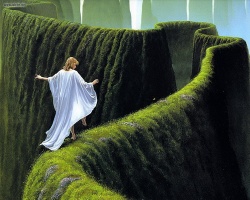Difference between revisions of "Hidden Lands of India"
m (Text replacement - "sun" to "{{Wiki|sun}}") |
|||
| Line 1: | Line 1: | ||
[[File:12-1024-768.jpg|thumb|250px|]] | [[File:12-1024-768.jpg|thumb|250px|]] | ||
| − | In [[India]], the secret land is known as [[Gyanganj]] or as [[Siddhashram]]. References are found in Valmiki's Ramayana and also in The Mahabharata. Guru Nanak (17th century), who established [[Sikkism]], referred to [[Sach Khand]]. | + | In [[India]], the secret land is known as [[Gyanganj]] or as [[Siddhashram]]. References are found in Valmiki's {{Wiki|Ramayana}} and also in The {{Wiki|Mahabharata}}. [[Guru]] Nanak (17th century), who established [[Sikkism]], referred to [[Sach Khand]]. |
| − | In Autobiography of a [[Yogi]]. (mid-20th century) Paramahansa Yogananda wrote about meeting the [[guru]] of his [[guru]]'s [[guru]] (his great-grandguru) named Mahavatar Babaji. He described him as still alive in the Badrinath region of the [[Himalayas]], and despite his great age he retained the appearance of a young man. | + | In Autobiography of a [[Yogi]]. (mid-20th century) Paramahansa Yogananda wrote about [[meeting]] the [[guru]] of his [[guru]]'s [[guru]] (his great-grandguru) named Mahavatar Babaji. He described him as still alive in the Badrinath region of the [[Himalayas]], and despite his great age he retained the appearance of a young man. |
| − | That [[guru]] was connected with [[Gyanganj]], as was the [[guru]] of Gopinath Kaviraj (died 1976,) the principal of the Government College of [[Sanskrit]] in [[Benares]], who wrote Siddhabhoomi about those mysterious places. His own teacher, the Bengali [[guru]], Swami Vishudhananda, had told him of the time he spent in Gyanganj studying Surya Vigyan (solar science.) The practice of that [[knowledge]] enabled him to manifest various objects and to transform one thing into another by manipulating the {{Wiki|sun}}'s rays. | + | That [[guru]] was connected with [[Gyanganj]], as was the [[guru]] of Gopinath Kaviraj ([[died]] 1976,) the principal of the Government College of [[Sanskrit]] in [[Benares]], who wrote Siddhabhoomi about those mysterious places. His own [[teacher]], the {{Wiki|Bengali}} [[guru]], Swami Vishudhananda, had told him of the [[time]] he spent in [[Gyanganj]] studying [[Surya]] Vigyan (solar [[science]].) The practice of that [[knowledge]] enabled him to [[manifest]] various [[objects]] and to [[transform]] one thing into another by manipulating the {{Wiki|sun}}'s rays. |
| − | [[Yogananda]] also knew [[Vishudhananda]], and described a meeting with him in Calcutta, where he witnessed his ability to manifest various perfumes on demand. | + | [[Yogananda]] also knew [[Vishudhananda]], and described a [[meeting]] with him in {{Wiki|Calcutta}}, where he witnessed his ability to [[manifest]] various [[perfumes]] on demand. |
[[File:Rifting-Spirit.jpg|thumb|250px|]] | [[File:Rifting-Spirit.jpg|thumb|250px|]] | ||
| − | Paul Brunton, in A Search for Secret [[India]] also reported that same [[siddhi]] of Vishudhananda's, and also claims that he saw him revive a dead bird. | + | Paul Brunton, in A Search for Secret [[India]] also reported that same [[siddhi]] of Vishudhananda's, and also claims that he saw him revive a [[dead]] {{Wiki|bird}}. |
| − | [[Gyanganj]] is generally described as a plateau in [[Tibet]] lying north of [[Kailash]]. Like Plato's [[Atlantis]], or a place out of Arthurian legend, it is described as surrounded by a moat filled with crystalline water. A bow-shaped drawbridge links it to our [[world]], and it can only by raised by one who knows how to do [[Surya Vigyan]]. | + | [[Gyanganj]] is generally described as a plateau in [[Tibet]] lying {{Wiki|north}} of [[Kailash]]. Like Plato's [[Atlantis]], or a place out of Arthurian legend, it is described as surrounded by a moat filled with crystalline [[water]]. A bow-shaped drawbridge links it to our [[world]], and it can only by raised by one who [[knows]] how to do [[Surya Vigyan]]. |
| − | (Parveen Chopra. Gyanganj, "Spirit Worlds," LifePositive.com) | + | (Parveen Chopra. [[Gyanganj]], "[[Spirit]] [[Worlds]]," LifePositive.com) |
| − | Akash Ganj | + | [[Akash]] Ganj |
| − | This place is in Arunachal Pradesh (north eastern India,) 120 km. from Rohing. Also known as [[Akash Ganga]], its focus is the small hill where the holy river is viewed as emerging from the topknot of Lord [[Shiva]]. The crystal spring spills down the rocks and collects in and around a small hill. | + | This place is in {{Wiki|Arunachal Pradesh}} ({{Wiki|north}} eastern [[India]],) 120 km. from Rohing. Also known as [[Akash Ganga]], its focus is the small hill where the {{Wiki|holy}} [[river]] is viewed as [[emerging]] from the topknot of [[Lord]] [[Shiva]]. The {{Wiki|crystal}} spring spills down the rocks and collects in and around a small hill. |
| − | Here it is believed that all species of animal live in perfect harmony. The pool is one of those that the birds seem to maintain by picking out any dead leaves or other things that might sully the water. | + | Here it is believed that all species of [[animal]] [[live]] in [[perfect]] [[harmony]]. The pool is one of those that the birds seem to maintain by picking out any [[dead]] leaves or other things that might sully the [[water]]. |
{{R}} | {{R}} | ||
[http://www.khandro.net/mysterious_places.htm#beyul www.khandro.net] | [http://www.khandro.net/mysterious_places.htm#beyul www.khandro.net] | ||
[[Category:India]] | [[Category:India]] | ||
[[Category:Pemako]] | [[Category:Pemako]] | ||
Revision as of 20:55, 19 September 2013
In India, the secret land is known as Gyanganj or as Siddhashram. References are found in Valmiki's Ramayana and also in The Mahabharata. Guru Nanak (17th century), who established Sikkism, referred to Sach Khand.
In Autobiography of a Yogi. (mid-20th century) Paramahansa Yogananda wrote about meeting the guru of his guru's guru (his great-grandguru) named Mahavatar Babaji. He described him as still alive in the Badrinath region of the Himalayas, and despite his great age he retained the appearance of a young man.
That guru was connected with Gyanganj, as was the guru of Gopinath Kaviraj (died 1976,) the principal of the Government College of Sanskrit in Benares, who wrote Siddhabhoomi about those mysterious places. His own teacher, the Bengali guru, Swami Vishudhananda, had told him of the time he spent in Gyanganj studying Surya Vigyan (solar science.) The practice of that knowledge enabled him to manifest various objects and to transform one thing into another by manipulating the sun's rays.
Yogananda also knew Vishudhananda, and described a meeting with him in Calcutta, where he witnessed his ability to manifest various perfumes on demand.
Paul Brunton, in A Search for Secret India also reported that same siddhi of Vishudhananda's, and also claims that he saw him revive a dead bird.
Gyanganj is generally described as a plateau in Tibet lying north of Kailash. Like Plato's Atlantis, or a place out of Arthurian legend, it is described as surrounded by a moat filled with crystalline water. A bow-shaped drawbridge links it to our world, and it can only by raised by one who knows how to do Surya Vigyan.
(Parveen Chopra. Gyanganj, "Spirit Worlds," LifePositive.com) Akash Ganj
This place is in Arunachal Pradesh (north eastern India,) 120 km. from Rohing. Also known as Akash Ganga, its focus is the small hill where the holy river is viewed as emerging from the topknot of Lord Shiva. The crystal spring spills down the rocks and collects in and around a small hill.
Here it is believed that all species of animal live in perfect harmony. The pool is one of those that the birds seem to maintain by picking out any dead leaves or other things that might sully the water.

